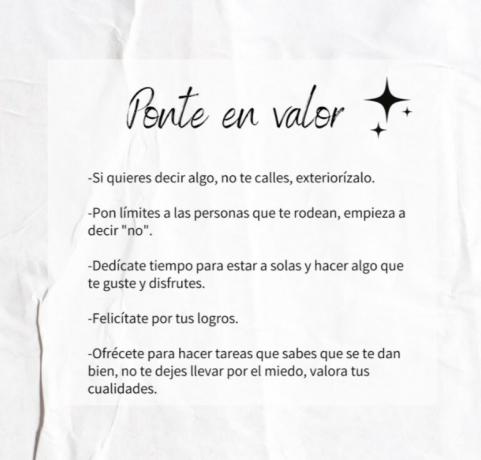The importance of emotional caresses
Have you ever stopped to think about how many times a day you say and think negative and hurtful phrases towards yourself? Like when you drop a pen and think "I'll be stupid!" Are you really stupid because you dropped a pen or have you just had a little coordination failure?
At this moment perhaps more situations are coming to your head; experiences in which you do not treat yourself with kindness. This is called self-abuse. In the next article We are going to talk about some of the reasons that give rise to this phenomenon known as self-abuse and how you could solve it to increase your well-being.
- Related article: "Emotional management: 10 keys to master your emotions"
Keys to combat self-abuse
To begin, I am going to propose a very simple exercise for which you only need a pen and paper. Well, here we go... think of three characteristics of your person that you like, when you have them, think of three characteristics of your person that you do not like…
Now let's compare. What have you spent more time thinking about? The things you like about yourself or the things you don't? Surely the ones you don't like you haven't even had to think about, they have automatically appeared in your mind; however, the features you like may have had to spend a little more time. Why is this happening?
- You may be interested in: "Do you really know what self-esteem is?"
Why do I identify the negative before the positive?
Each person has a unique life story, in which different aspects of his personality have been positively reinforced and others have been punished.
In addition, as we grow, we are imposed (directly or indirectly) guidelines and objectives to meet such as: behaving well, getting good grades, being good at a sport, being educated... Guidelines and objectives that become more complex and difficult to meet as we get older.
Receiving these messages as we grow up is shaping our personality and, little by little, we are integrating these messages in our person, generating high levels of self-demand in different areas of our life. This ends up causing us to end up punishing ourselves when we do not meet our expectations and those of our environment.
Self-demand slowly creeps in in a subtle way in different situations of our life and, we end up as in the example at the beginning of the article, insulting each other because we have dropped the ballpoint. Self-treatment eventually becomes normal and we have the whip in our hand all day, leaving very little room for self-care. emotional caresses.
- You may be interested in: "Dysfunctional perfectionism: causes, symptoms and treatment"
Trading the whip for the emotional caress
Once we have identified the origin and maintenance of this tendency to self-punishment, the next step is to know how this can be changed. We are going to give you some interesting guidelines to get you started.
The first thing you should do is start to identify those situations in which you insult yourself and devalue yourself. For this I propose that for a week you write down (in a notebook, in the notes on your mobile, in your agenda ...) every time you you think and / or say something negative about yourself, like: "I'm stupid, I'm not good for this, I'm not going to get it, I'm a disaster, I'm Useless...".
The fact of saying these phrases to us at the end ends up generating in us the idea that we are worthless and, in the end, we end up acting based on those messages, which causes us to position ourselves, many times, as secondary actors and actresses in the filming of our lives.
- You may be interested in: "Self-fulfilling prophecies, or how to carve out a failure yourself"
Starring in your life ...
To go from the whip to the caress, It is not only important to be aware of what you say to yourself, but also what you value and express yourself to the world and how you position yourself and allow yourself to be treated by others. Every time you lose courage or step aside, you agree with the whip and walk away from the caresses.
This can occur in very subtle ways and that we have very normalized, so let's see several examples:
- When something has happened to you that has made you excited or angry, you are going to tell someone about it, but you think "it doesn't matter, I'm not going to bother him with this, it's not that important."
- When you decide that you are going to tell a friend what happened to you and you start saying "it's silly", when it is something that matters or affects you.
- When you finish telling him and you say "I'm shut up because I've talked too much, what a speech I've given you."
These types of phrases that are used almost unconsciously are also a whiplash to your person, because they take away the value of what you say and what happens to you although, really, if the need arises to tell it, it does matter.
Ask yourself the following: When you measure the importance of what happens to you, what are you comparing it to? You should still rethink that meter.
- Related article: "The Self-Efficacy of Albert Bandura: Do you believe in yourself?"
Put yourself in value
Once you have identified these situations, try to take perspective of the situation and ask yourself the following question: Does this that I just said / did bring me closer to or away from? good deal towards me?
As you identify these situations, you will become aware of it and, little by little, you will take perspective more automatically and begin to treat yourself with more kindness; emotional caresses will become more present in your life.
To finish, we leave you some guidelines that you can put into practice to take care of yourself not only on the inside, but also on the outside in your relationships.

And remember, in PsychoAlmeria We will assist and help you both in person and online. In this therapy center you will find psychologists with extensive training and experience who will help you identify those Thought and belief schemes to adapt new patterns that will generate the emotional well-being you need. You will receive all the help in a personalized way and always meeting your goals to achieve your emotional well-being. A new stage awaits you to move from abuse to good deal towards your person.



